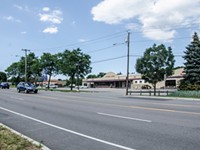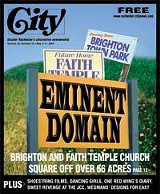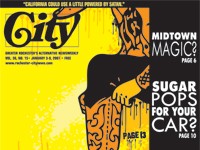[
{
"name": "500x250 Ad",
"insertPoint": "5",
"component": "15667920",
"parentWrapperClass": "",
"requiredCountToDisplay": "1"
}
]
Read the US Constitution. No matter how long you search, you will never find the phrase "eminent domain."
It is a legal procedure that authorizes the government to take private property for a price it deems appropriate, whether or not the owner has any intention to sell. The practice and its application are grounded in national jurisprudence and historic tradition, and its roots are actually in the Constitution.
In other words, if the government has plans that meet criteria deemed beneficial to the community, and those plans require the use of your land, it can force you to sell the property.
That's the message being conveyed to a Brighton church, the 69-year-old Faith Temple on 1876 Elmwood Avenue. The church recently entered into a contract with a private landowner to purchase a 66-acre parcel of property off Westfall Road. Faith Temple wants to use the land to build a new church complex, complete with a school and possibly a senior home, since its current location is no longer suitable for the 1,300 to 1,400 weekly attendees.
But the Town of Brighton has been trying to buy the land for years. Owner Alan Groos insists the town hasn't been willing to pay enough for it. In mid-April, Brighton announced it has initiated eminent domain proceedings. The town held a public hearing on the matter on April 28 as part of the monthly town hall meeting.
The gathering was a contentious, rollicking affair. More than 300 people overflowed the assembly room and spilled out into the lobby. Many watched the proceedings on closed-circuit television. Others socialized in the atrium and lingered on the stairs outside.
The public commentary section of the meeting began at 7:20 p.m. and lasted until a few minutes before midnight. Members of the audience who were at the meeting to address other items on the agenda appeared alternately captivated and glassy-eyed.
They shared newspapers in the lobby and spoke on cell-phones just outside the entrance of the building. One man joked under his breath about catching a late movie and coming back. Another, the president of a local corporation, sat down, tilted his head back against the wall, closed his eyes, and, by 11:30 p.m., was snoring audibly not 10 feet from the open doors of the lively assembly.
Inside, many of the church's supporters expressed disappointment at the town's decision to initiate eminent domain. Church officials and members said they were still involved in negotiations with the town for some kind of settlement of the issue. They said the plot of land could accommodate both the new building Temple Faith plans to construct as well as the park the town intends to develop.
The disputed property sits directly in the middle of two other parcels of unused land --- one plot owned by the church, and the other by the town.
"Why are you putting your park in the middle of our parcel of land instead of putting it on one side or the other?" said the Rev. Stephen Edlin, the pastor at Temple Faith, as he spoke before the board and the assembled crowd.
The town and its supporters said the plans for the park had been in the works for years. They were made public and widely supported by a four-to-one margin in a town referendum in December, 2002. The referendum described the town's plans and listed the properties that would have to be acquired.
The Groos property is listed as an "alternative" acquisition. At last week's meeting, Town Supervisor Sandra Frankel said it was a "critically important" aspect of the central park and open space the town envisions.
The properties listed in the referendum came from the town's 2000 Comprehensive Plan. Item four of its "Open Space and Recreation Recommendations" reads: "Acquire a minimum of 32 acres of open space suitable for active and passive recreation.... The preferred location is adjacent to existing parkland or significant open space areas."
The plan also lists a series of "Open Space Areas Recommended for Acquisition." Area 6 of this list is the Groos property. The plan concludes, "Area 6 should prove suitable to meet the requirements of [item] number 4 [of the Open Space and Recreation Recommendations]."
Church officials say "Area 6" is 66 acres, while "Item number 4" recommends the acquisition of 32 acres, so the town does not need the entire parcel. Church officials also reference a passage in the Comprehensive Plan that encourages the town to be flexible.
"The Areas Recommended for Acquisition below do not represent the only areas in Brighton that would be valuable additions to the town's parkland inventory. If any of the areas recommended for acquisition cannot be acquired in a reasonable amount of time and/or under reasonable terms, suitable alternative areas should be found to replace them," the report says.
Glenn Baker, the executive director of administration at Faith Temple, says the town should not allude to the report if it is not prepared to follow its recommendations.
"If eminent domain is reasonable, then what is unreasonable?" he says.
Church officials insist they had the blessings of the town to pursue the Groos property, since the board was unable to reach a deal to purchase the land. The understanding was, according to Baker, once the church acquired the land, it would negotiate with the town and reach a satisfactory agreement allowing both sides to use the space for their respective needs.
The church signed the purchasing agreement with Groos on January 13, Edlin said at the public hearing. Two days later, church officials met with Brighton Commissioner of Public Works Thomas Low. During that meeting, Baker says, Low encouraged them to proceed with their plans, as the town had been unable to reach a deal with Groos. Low asked the church to provide the town with a detailed account of their plans for the property, as well as a timeline for development, Baker said.
The church did not have any further communication with town officials until April 13, Baker says, when it was informed that Brighton had initiated eminent domain proceedings to acquire the land.
Low says he has a different recollection of the January meeting.
"[The church] simply informed me that they had acquired the property," Low says. He then informed the church officials of the necessary steps it would have to take in order to proceed with any development plans, which is part of his job, he said.
Asked if he had encouraged the church officials to proceed with their plans to purchase the property, he said "no." In fact, he reiterated the town's intention to acquire the property, he said.
The town had made an offer to Groos, Low said, which was rejected. The town now has 90 days to make a formal offer based on "fair market value" for the land. Though technically Groos is still currently the owner, the purchasing agreement should be finalized soon, and the church will likely own the land when the town makes its formal offer.
"Mr. Groos, I'm here to tell you, we will close on the land," Edlin said during the public hearing.
Low says the town is employing a responsible use of eminent domain, as the land will be used for a public purpose and a fair price will be determined.
Among the town's supporters who spoke at the meeting was Hugh Mitchell, the chair of the regional chapter of the Sierra Club, which backs the effort to establish a public park. The need for municipal and government protection of open space is vital in combating suburban sprawl, a growing concern in Brighton, he said.
"The public-space spirit and the feeling involved is larger than the vision of one church," Mitchell said. He said eminent domain has played a positive role in the past. As an example, he cited Genesee Valley Park, which he said sits on land that was obtained through eminent domain.
Other proponents of the park plan invoked the potential communal use of the space, especially for youth sports leagues that must share a limited number of fields in the town. Representatives and coaches from various soccer and baseball organizations asked the church members to think about how constructive the space could be for children involved in extra-curricular sports and other recreational activities.
"We've got nowhere else to go," said Tom O'Rourke, the director of a local youth baseball club that has 1,000 kids of a variety of ages and skill levels, but not enough fields to play the games. "We desperately need these fields."
Groos spoke at the hearing and defended what he said was his right to sell his property to whomever he sees fit.
"Does anyone here object to me selling my land to someone who gives me fair value?" he said.
He glared at the board members and claimed they had lied to him for years about the value of his land.
"I am offended by you. I have been offended by you for a very long time. You have not been honest. You have not been fair," he said.
"The town is like a little kid at Christmas. They make a list, 'we want this, this, and this,' and they expect mommy and daddy to show up Christmas morning and give them everything on the list," Groos said.
Last year, an appraiser from the town checked the property, Groos said.
"Yet I never saw the appraisal. Was the price too high?" he said.
Church officials say they left with hopes of returning to the negotiating table with the town. The town, however, says it is the will of the voters to create this park, and it will do whatever it takes to satisfy Brighton's residents.
Eminent domain: a primer
Since the early days of the country's history, eminent domain has fueled a number of arguably necessary and publicly popular projects throughout the nation. It has played an important role in the growth of the railroads and the electrification of rural lands, and has been used to clear space for bridges, tunnels, government buildings, and airports.
Eminent domain can be initiated by local, state, or federal government, and centers on the ability to acquire private property considered important to the public interest. The landowner is forced to sell, but must be compensated based on what is determined to be "fair market value." The authority that wants to take the land files an estimate of the property's worth upon the declaration of its intentions.
The process is rooted in the Fifth Amendment of the US Constitution, which orders that no "private property be taken for public use, without just compensation."
Though it has been used for public good, many instances of eminent domain have raised questions of abuse.
The Institute for Justice, a nonprofit law firm based in Washington, DC, released a report last year documenting what it considers to be unjust applications of the process.
Among the examples the report cites are the eviction of a woman in her 80s from her home of 55 years in Bremerton, Washington, for a sewer plant expansion that never happened. Instead, the site was turned into an auto dealership. In New York City, the Empire State Development Corporation condemned an entire Times Square block on Eighth Avenue between 40th and 41st Streets for a new 52-story office tower for The New York Times. In Port Chester, New York, a Hispanic neighborhood occupied by antique shops, specialty retail, and restaurants, and described by the Institute for Justice as "thriving," was condemned. The village had made a deal with a private contractor who wanted to turn the area into a big-box shopping center.
"As early as 1795, the US Supreme Court described the power of eminent domain --- where the government takes someone's property for a 'public use' --- as 'the despotic power,'" the report states.
New York State, according to the Institute for Justice, is "perhaps the worst state in the country for eminent domain abuse."
One controversial aspect of eminent domain is the lack of a clear-cut definition of "just compensation" in the Constitution. Federal and state codes have spelled it out as "fair market value," though no exact formula for determining such a figure has been agreed upon nationally.
The "fair market value" declared by the government agency initiating eminent domain is often a cause of contention by the landowner. Sometimes the issue is settled amicably when both sides agree on a figure, while other times the issue evolves into a legal battle. In some cases, the private citizen whose land has been targeted can no longer compete financially with the government and eventually concedes.
Speaking of...
-

Urban Action 2/21
Feb 21, 2018 -

Plaza scrutiny begins
Jul 29, 2015 -

Bike lane, trail projects receive state funding
Jan 17, 2014 - More »
Latest in Featured story
More by Tarek Tannous
-
GOP chooses choice?
Jun 23, 2004 -
Renaissance speak-out
Jun 9, 2004 -

Waste management
Jun 2, 2004 - More »






